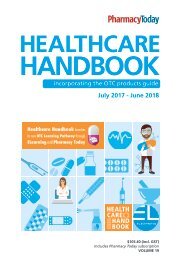2017 HCHB_digital
Create successful ePaper yourself
Turn your PDF publications into a flip-book with our unique Google optimized e-Paper software.
Urinary Incontinence<br />
Urinary incontinence, or loss of bladder control, is when urine accidentally leaks<br />
from the bladder. In some people, just laughing, coughing or sneezing can cause<br />
leakage. The amount of urine that leaks can range from just a few drops up to<br />
the entire contents of the bladder.<br />
More than 1.1 million (25%) of New Zealanders experience bladder or bowel<br />
control problems. Urinary incontinence has been identified by the World Health<br />
Organization as a major health issue in developed and developing nations.<br />
Stress incontinence<br />
This is when the bladder leaks due to physical pressure, usually from lifting,<br />
exercising, coughing, sneezing or laughing. It happens when a person has weak<br />
pelvic floor muscles or a weak urethral sphincter.<br />
Pelvic floor muscles hold all the pelvic organs in their correct positions, and<br />
also help keep the urethra closed, preventing leakage. The urethral sphincter is<br />
a band of muscles around the urethra that, for the majority of the day, remain<br />
tightly squeezed, keeping urine in the bladder. Nerve endings in the bladder<br />
send a message to the spinal cord and brain for urination to occur once a certain<br />
amount of urine has accumulated in the bladder. This results in relaxation of both the<br />
sphincter and pelvic floor muscles. In people with stress incontinence, these muscles<br />
are not strong enough to withstand the extra pressure lifting, exercising, coughing or<br />
sneezing places on them. They involuntarily relax, allowing urine to escape.<br />
Causes of stress incontinence include pregnancy and childbirth, menopause,<br />
constant coughing, lots of heavy lifting, being overweight, straining to empty the<br />
bladder or bowel, ageing, a lack of fitness or extreme exercise.<br />
Urge incontinence<br />
This is when there is a sudden, strong urge to pass urine and the person is unable to<br />
hold on until they reach the toilet. People with urge incontinence may also feel the<br />
need to urinate more often, including at night, even though their bladder is not full.<br />
Urge incontinence occurs as a result of inappropriate contraction of the<br />
urethral sphincter muscle, or the detrusor muscle of the bladder wall. Often these<br />
contractions occur regardless of the amount of urine that is in the bladder.<br />
Causes include urine infections, stroke, Alzheimer’s disease, Parkinson’s disease,<br />
diabetes, certain medications and prostate problems. A "Can't Wait" toilet card is<br />
available free from www.continence.org.nz for people with a medical condition<br />
who need to let strangers discreetly know that they need a toilet quickly.<br />
Overflow incontinence<br />
This happens when the bladder is unable to fully empty itself. It becomes too<br />
full, causing it to overflow and regularly leak or dribble small amounts of urine.<br />
Causes include prostate problems, diabetes and certain medications.<br />
Incontinence due to physical/neurologic abnormalities<br />
Anatomic or neurologic abnormalities may affect the urinary system and cause<br />
incontinence, such as fistulas (an abnormal opening between the bladder and<br />
another structure).<br />
Damage to the nervous system that regulates bladder control can also occur<br />
due to trauma, disease or injury. This may cause the bladder to be underactive<br />
(unable to contract and empty completely) or overactive (contracting too quickly<br />
or frequently).<br />
Other causes<br />
Incontinence can also be a result of surgical procedures such as prostate or rectal<br />
surgery and caesarean surgery. Some people (mostly women) can experience<br />
both stress incontinence and urge incontinence simultaneously.<br />
Incontinence can also occur simply due to a person’s inability to physically get<br />
to a toilet, or to communicate this need to a caregiver.<br />
Overactive Bladder Syndrome<br />
Overactive bladder (OAB) syndrome is a general term used to describe the<br />
symptoms of urinary urgency with or without urge incontinence, including the<br />
frequent need to go to the toilet, and having to urinate more than once at night.<br />
In summary, OAB is the condition, and urinary incontinence is a symptom of OAB.<br />
TREATMENT OPTIONS<br />
Category Examples Comments<br />
Incontinence pads/pants<br />
Furniture liners<br />
eg, Attends range, Comforts Pads,<br />
Confitex, D-Brief range, Depend range,<br />
Molicare range, MoliMed, Poise Pad<br />
Rrange, Tena range<br />
eg, DryLife Absorbent Bedliner, DryLife<br />
Seatliner<br />
Minimise contact between urine and skin. May be reusable or disposable. Useful for temporary incontinence,<br />
before seeing a doctor, or if medical options have been unsuccessful or are not appropriate. Most provide high<br />
absorbent capacity with little bulk. Menstrual pads are not suitable for urinary incontinence since their absorption<br />
capacity is limited and they become lumpy and leak when sodden. Consider the customer’s needs (light, moderate<br />
or heavy) and whether assistance is needed to use and change the product.<br />
Draws in and traps moisture, protecting bedding or furniture and minimising wetness. Absorbs 2.5L over eight hours.<br />
Machine washable.<br />
Barrier products<br />
eg, dimethicone (Silic 15), zinc<br />
(Sudocrem), zinc and castor oil, vitamin A<br />
and calamine (Ungvita Cream)<br />
Silicone or zinc-containing barrier creams protect the skin from the irritating effects of urine. Wash urine off<br />
the skin with a mild cleanser and water before applying.<br />
PharmacyToday.co.nz A part of your everyday.<br />
New Zealand’s premier pharmacy website keeping you up to date between issues.<br />
www.pharmacytoday.co.nz<br />
Page 156 HEALTHCARE HANDBOOK <strong>2017</strong>-2018 Common Disorders



